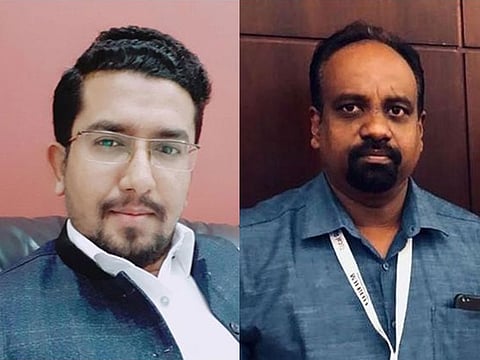How two UAE-based frontline workers beat coronavirus
Thankful for being in the UAE, the patients recount their recovery process

Dubai: COVID-19 can strike anyone, but those working on the frontlines across various essential services are always at greater risk.
Two such frontliners - a radiologist and a utility company representative - who contracted the virus say they are lucky to be in the UAE where timely testing and medical intervention made all the difference to their early recovery. Here is their account:
Radiology technician, who recovers, keen to get back to work
Rajesh Phillips Kantayen from Chennai, India, is a radiology technician at a diagnostic centre in DUbai. The 48 year old contracted the virus in the process of conducting chest X-rays for numerous COVID-19 positive patients. “In order to understand the full extent of chest infection and pneumonia, chest X rays are a must.
“I was taking full precautions, but somehow I got infected,” said Kantayen, who also has diabetes and hypertension.
Kantayan said he owed his health and life to a dedicated team of nurses, doctors and health care workers who worked very hard to make him recover.
“On April, 1, I had a lot of trouble breathing and I immediately went for tests. My oxygen saturation was low and a CT scan showed multiple pneumonia patches in both my lungs. My diagnostic centre medical director got me admitted at Prime Hospital, under Dr Adel Al Sisi, even before the COVID-19 test was done. The samples were taken at the hospital but the treatment began on the same day although my report came in the next day. Throughout my stay at the hospital, it felt like home, the level of care and concern was so good. My wife and two children underwent the nasal swabs as well and they luckily tested negative,” said Kantayen.
Kantayen was shifted to an isolation ward, provided all the medication and IV drips and had oxygen administered to him continuously for seven days while he was being treated.
“The nurses and medical staff took excellent care; I was advised to sleep in a sitting position to allow my phlegm to loosen up. It took seven days for the fever to subside and the oxygen to be taken off. I tested negative twice and was discharged on April 14. I am happy to be on my 14-day quarantine at home. My family is also under quarantine and we all are in different rooms. I spend time talking to people on the phone, reading the bible and watching television. When my quarantine gets over, I look forward to reporting back to duty,” said Kantayen.
Utility staff grateful for quick turnaround
Mohammad Adnan, 31, a resident of Sharjah who is a utility company staff in Dubai, said he contracted the virus on the job. “On March 22, I was sitting with a colleague who seemed sick. The next day he was too ill to come to work. He was tested for COVID-19 and the test results on March 27 showed he was positive. Six days after I had met him, I started having fever and body pain. When I learnt of his test report, I immediately contacted my physician who recommended that I get tested for coronavirus. My test results also came positive on March 29. I had mild systems, no cough or difficulty in breathing, and my doctor advised self-quarantine at home. But on my insistence I was admitted to Prime Hospital’s isolation ward on April 4. They began giving me some medication. I continued to feel tired for about 10 days and two negative tests, 24 hours apart, proved I was negative. Now I have been shifted to a special quarantine facility,” said Adnan, bachelor who hails from Punjab province in Pakistan.
He added: “There is a lot of fear regarding COVID-19, but people need to be careful, practise strict social distancing, hand hygiene and observe the lockdown seriously. Those who have to work need to report immediately to health authorities if they have fever or cough or body pain. Quick and timely medical intervention plays a great role in recovery.”
Doctor speak
Dr Adil Mohammad Yasin al Sisi, Chief Medical Officer at Prime Hospital, told Gulf News: “We are taking no chances with any patients and following the DHA medical protocol for COIVD-19 treatment.”
Recounting the treatment protocol for the two patients, Dr Al Sisi said: “In the first case, the X-ray showed heavily infected lungs. Since he had diabetes and hypertension, we not only administered hydroxycholorquine and antivirals along with antibiotics and paracetamol under very careful monitoring, we also provided him additional oxygen support. I monitored his blood pressure and blood sugar medication as well during the 10 days. Only when his pneumonia subsided did we wean him off additional oxygen supply,” explained Dr Al Sisi.
In case of the utility staff, Dr Al Sisi said the patient was a mild case as age and lack of co-morbidities helped his immune system lower the viral load.
“He was given azithromycin aalong with cough syrup, pain killers and paracetamol. He did not require hydroxycholoquine or anti-virals and his recovery was quick.”






